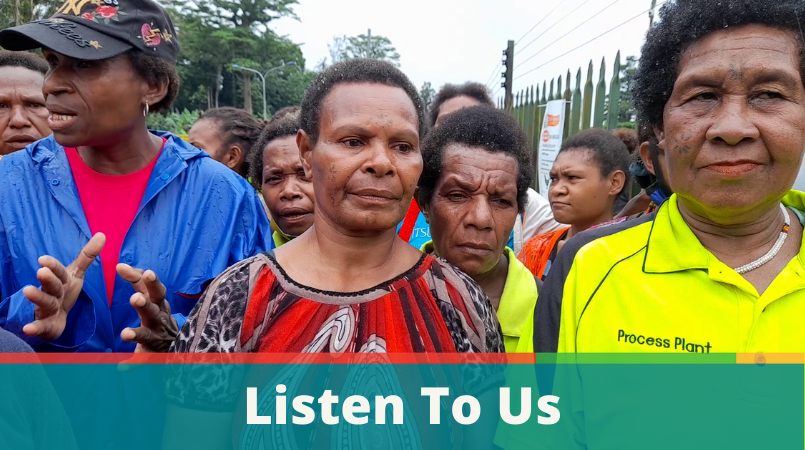
They have sacrificed their time and families to keep the company going through its dark days.
The farm and factory workers of Mainland Holdings Ltd wish the same courtesy could be extended to them. All they want is for management to listen to their fears regarding the COVID-19 vaccine and look for a way forward.
Ellis Philip works at the wrapping unit of the Six-Mile Tablebirds processing plant.
She has been with the company for 11 years.
Most of the women she works with are either widowed, divorced or separated. They commonly refer to themselves as “trangu mama”.
When COVID-19 first emerged, almost all companies had to downsize to save their operations, and Mainland Holdings was no different.
“Na kampani em klostu lo pudaun,” Philip said. (The company almost fell.)
“Mi disla lapun mama wantem sampla mobs blo mi, mipla wok stap i go nau, mipla bringim disla kampani kam. (I, this old woman, with some of my colleagues worked together and brought this company forward.)
“At least ol peim K150 o disla, mipla tok taim nogut, gutpla taim yumi save stap wantaim so bai mipla burukim tit na bai mipla wok.” (At least they paid us K150 or so, we said we’ve been through thick and thin so we will grit our teeth and work.)
Philip outlined that factory and mill workers are not highly educated, and the least the company could have done was bring in qualified professionals to talk to them about the vaccine and especially the myths surrounding it.
Helen Jimbu, a cutter within the processing plant, pointed out that their wellbeing was never prioritised.
The lack of safety gears and all the damaged or worn out equipment have only forced the staff to work in hazardous and unhygienic conditions.
The women manually cut whole chickens. There are two shifts in a day; shift A starts at 7am to 7pm while shift B takes over from 7pm to 7am the next day.
The quota for each shift is 20,000 chickens, which means a worker can cut up to 10,000 chickens in a shift. Most of the mothers have knee and associated problems for standing long hours; they can only rest for up to an hour in the 12-hour shift.
“Mipla save werim tongs na mipla save sanap na katim kakaruk,” she said. (We cut the chicken in our slippers.)
“Em lo ’95 kam olsem. Ol sa tok wan minit lo sikspla kakaruk. Wing i go, nek paip i go, ok cocktail, thighs na breast em mipla sa opereitim na mipla save salim go na ol lain lo packing i stap we ol sa holim trei na pekim.” (That was since ’95. They tell us, spend one minute on six chickens. We cut the wing, the neck, ok cocktail, thighs and breast then we send to the packing unit, who pack them into trays.)
“Taim kampani i bin laik daun, mipla stragol, mipla wokim wok,” said Anna Siona from the wrapping unit. (When the company was going down, we struggled and worked.)
“Mipla statim lo 7, sampla taim ol sa tok olsem, bai yupla pinis lo 11 o’clock nait. (We start at 7am. Sometimes, they tell us, you’ll finish at 11pm.)
“Mipla sa taied, mipla go lo haus, ol pikinini ol nidim presens blo mipla tasol mipla no sa go sidaun na toktok wantem ol pikinini. (We get so exhausted when we go home. Even though our children need our time, we do not have the strength to sit and talk with them.)
“Mipla go rausim ol samting, mipla kaikai, waswas, silip na kirap em mipla no lukluk lo husait, husait. Mipla kam bek lo wok. (We just remove our work clothes, eat, wash, sleep and when we wake up, we don’t look around. We go back to work.)
“Mipla tingim wok mani na mipla kam wok but nau disla samting em brukim mipla na nau mipla stap na rein wasim mipla, mipla sanap wantem kol, mipla toktok strong olsem, mipla ino laikim disla sut.” (We think about our survival and we come to work but now this issue has torn us up. We are here, drenched in the rain, cold and we are stressing that we do not want this injection.)
The MHL factory, mill and crocodile farm staff are currently on day three of their stop-work protest.
They are currently printing their petition to submit to the MHL management, the Morobe Provincial Government and Nasfund, the major shareholder.
